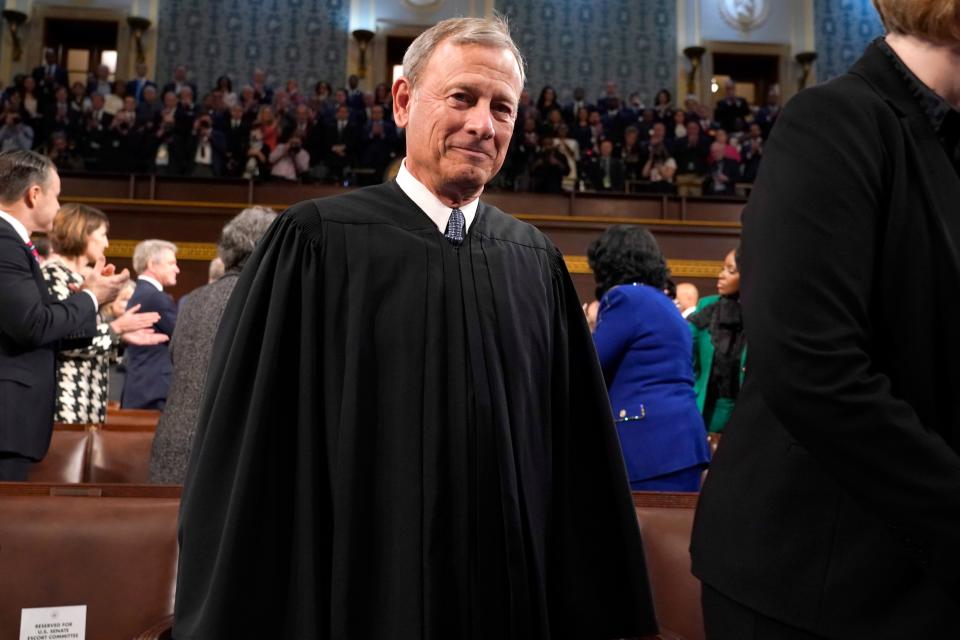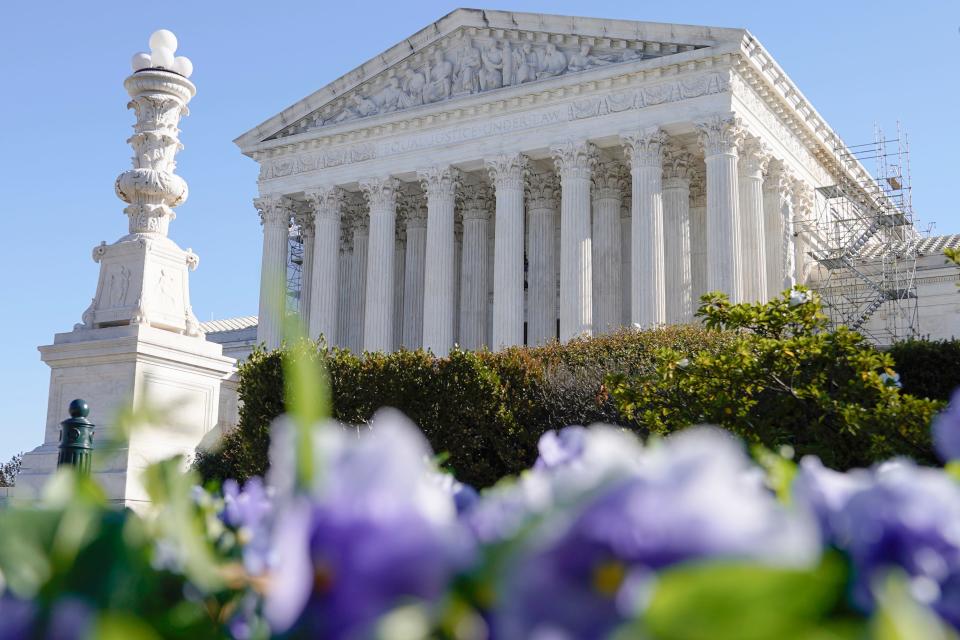Amid blowback over Clarence Thomas travel, Supreme Court says it will adopt first-ever code of conduct
- Oops!Something went wrong.Please try again later.
- Oops!Something went wrong.Please try again later.
- Oops!Something went wrong.Please try again later.
The Supreme Court announced Monday that it will honor a code of conduct for the first time in its 234-year history − a response to a litany of recent controversies involving private jet travel and posh vacations accepted by some justices that polls suggest has undermined public faith in the nation's highest court.
"For the most part these rules and principles are not new," the court said in a statement. "The absence of a code, however, has led in recent years to the misunderstanding that the justices of this court, unlike all other jurists in this country, regard themselves as unrestricted by any ethics rules."
The code, which the court said was agreed to by all nine members of the court, encourages justices to recuse from a pending case if they have "a personal bias or prejudice concerning a party."
It also says justices should not speak at events sponsored by or associated with a political party or a group that "has a substantial financial interest in the outcome of a case" before the court. A justice, the code reads, can accept "reasonable compensation and reimbursement" for travel "if the source of the payments does not give the appearance of influencing the justice’s official duties or otherwise appear improper."
Illinois Sen. Richard Durbin, the Democratic chairman of the Senate Judiciary Committee, called the announcement a "step in the right direction" on the Senate floor. A frequent critic of the court, Durbin framed the code as a symbolic victory, even as he raised concerns about how much teeth the document will have.
"For the first time in history, the Supreme Court of the United States is at least saying to the American people, 'we hear you,'" Durbin said.

Supreme Court critics: Where's the enforcement?
But the code itself included no enforcement mechanism, an omission the court's critics immediately jumped on. Outside experts have said enforcing a code of conduct on the Supreme Court would be especially tricky, given that no other tribunal exists that could overrule a decision made by a justice or the court itself.
Others criticized the court's statement for describing the ethics scandals that have swirled around the court as a "misunderstanding."
"Unfortunately, that reaction, and this code, leave much to be desired," said Gabe Roth, executive director of Fix the Court, a group that has long advocated for tighter ethics standards at the Supreme Court. "That it's largely a copy-and-paste job from the lower court's code fails to account for so much."
To say the code of conduct "fails to meet the moment would be an understatement," said Caroline Ciccone, president of a group called Accountable.US, which has been a sharp critic of the court and Thomas. "After a year of countless ethics issues and mounting pressure to fix its corruption crisis, the court released a set of written − and apparently unenforceable − guidelines."
In a statement attached to the code, the court said that Chief Justice John Roberts had directed court officials to review how state and lower federal courts have helped jurists comply with similar requirements. Roberts noted that some lower courts rely on software to help judges flag potential conflicts of interest in pending cases.
In other words, it's possible the Supreme Court could take other steps.
The announcement was an acknowledgment that many Americans were "ranting and raving" about the fact that the court had done little to address the criticism over ethics, said Timothy Johnson, a professor of political science and law at the University of Minnesota. On the other hand, he said, the line about looking to other courts was an acknowledgment that "they haven't fully figured it out yet."
"It's pretty hard to write rules when people are in the middle of breaking whatever rules you might be creating," Johnson said.
"To me, the real question is how the public is supposed to have confidence that the justices are complying with whatever rules they’ve chosen to adopt," said Stephen Vladeck, a law professor at the University of Texas. "Even the most rigorous ethics rules of which one might conceive are meaningless if there’s no means of monitoring whether they’re being followed."
Supreme Court ethics rules follow months of revelations about Thomas
The announcement arrived at a moment when the Supreme Court has been heavily criticized after a series of stories this year detailing lavish travel that Justice Clarence Thomas accepted from GOP donor Harlan Crow, as well as revelations that Justice Samuel Alito flew to Alaska for a fishing trip on a private jet in 2008 that belonged to a hedge fund manager who repeatedly brought cases before the high court.
Those revelations spurred Democrats in Congress to pursue legislation that would require the Supreme Court to adopt a code of ethics, similar to what lower federal courts follow. Democrats on the Senate Judiciary Committee have threatened to subpoena Crow and Leonard Leo, a well-connected conservative legal advocate who has appeared on many of the trips at issue, though that effort was abruptly stalled last week.
It is not only conservative justices who have been the subject of ethics revelations: Justice Sonia Sotomayor, a liberal, drew attention this year after a story by the Associated Press documented that some of her aides pressed colleges and a library to order copies of books she had written in connection with public speaking events.
But Thomas, the most senior associate justice, has been at the center of the bulk of the stories, many of which appeared in ProPublica earlier this year. They include revelations that Crow purchased three Georgia properties from Thomas and members of his family in 2014, a transaction the justice failed to note on his annual disclosure forms.
Another story documented that Crow had paid private boarding school tuition for a member of Thomas' family. Yet another, published in the New York Times, showed that Thomas purchased an RV with a personal loan from a wealthy health care executive. The terms of that loan have not been disclosed but congressional Democrats say that it appears much of the principle was never repaid before it was ultimately closed.
Thomas has repeatedly pushed back on the stories and denied wrongdoing. In a statement released in August, an attorney representing Thomas defended the justice's past reporting and dismissed criticism of the gifts as partisan attacks.
The attorney, Elliot Berke, blasted Thomas' critics as "left-wing organizations with largely undisclosed supporters that stand diametrically opposed to his judicial philosophy." Berke said that while public figures "may be the targets of weaponized ethics allegations,… all Americans" ultimately suffer from the criticism.

While Roberts has steadfastly defended the Supreme Court's independence, the chorus of calls for some sort of response to the scandals has shown little sign of quieting this year. Three justices − Elena Kagan, Brett Kavanaugh and Amy Coney Barrett− in recent weeks all appeared to publicly endorse some form of a conduct code.
As the criticism has continued, public polling has indicated that trust in the high court remains at record lows. Less than half of Americans said they have confidence in the Supreme Court, according to a Gallup survey in late September. Those polls have tended to show a far higher disapproval of the court among Democrats than Republicans.
The ethics debate has cast a shadow over the term, which began in October and runs through June. The court has been steadily building a docket that includes some blockbuster controversies, including a case about whether the government can block domestic abusers from owning guns, whether the abortion pill mifepristone will remain widely available and whether courts will have more power to curb federal agencies.
This article originally appeared on USA TODAY: Supreme Court adopts code of conduct after Clarence Thomas scandal

